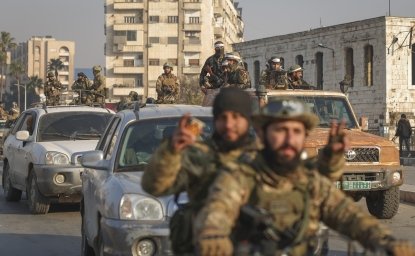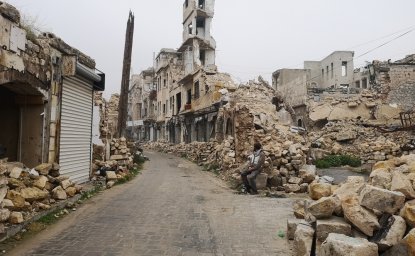Mission Impossible? Triangulating U.S.-Turkish Relations with Syria’s Kurds


On April 7 Syrian opposition rebels backed by airpower from the U.S.-led Coalition against the Islamic State (ISIS) declared that they had wrested Al Rai, a strategic hub on the Turkish border from the jihadists. They hailed their victory as the harbinger of a new era of rebel cooperation with the United States against ISIS in the 98-kilometer strip of territory bordering Turkey that remains under the jihadists’ control. Their euphoria proved short-lived: On April 11 it emerged that ISIS had regained control of Al Rai and the rest of the areas the rebels had conquered in the past week. Details of what happened remain sketchy because poor weather conditions marred visibility. But it was still enough for Coalition officials to describe the reversal as a “total collapse.”
The Al Rai fiasco is more than just a battleground defeat against the jihadists. It’s a further example of how Turkey’s conflicting goals with Washington are hampering the campaign against ISIS.
For more than 18 months the Coalition has been striving to uproot ISIS from the 98-kilometer chunk of the Syrian-Turkish border that is generically referred to the “Manbij Pocket” or the Marea-Jarabulus line. The need to close the pocket gained fresh urgency following the Paris and Brussels terror attacks. It has already been established that the perpetrators of the Paris blasts traveled from Manbij to Turkey to Europe. It’s no secret that ISIS is itching to go after the United States next.
The Manbij Conundrum
Plugging the Manbij hole ought not be so hard. A Syrian Kurdish militia known as the People’s Defense Units (YGP), which is at the helm of a mixed force of Kurds, Arabs, Turkmens, and other minority ethnicities known as the Syrian Democratic Forces (SDF), has already with the help of Coalition airpower driven out ISIS from huge swathes of land in northeastern Syria. Using the recently captured Tishrin Dam as a launching pad, the SDF is ready to take them on in Manbij.
The trouble is that Turkey says it will not allow the YPG and its allies to go it alone and insists that its own rebel proxies do the job instead. But the rebels’ latest humiliation by ISIS highlights their divisions and lack of experience. Turkey has long called for the United States to ditch its partnership with the YPG because of the latter’s intimate ties with the Kurdistan Workers’ Party (PKK), which has been fighting for Kurdish self-rule inside Turkey since 1984 and is designated as a terrorist organization by the United States and the European Union alike. Ankara also insists that SDF Arabs and Turkmens defect to Turkey’s proxy rebel force. After the Al Rai debacle, this is even more of a pipedream. If anything Arabs are more likely to gravitate to the SDF. This would chime with Washington’s efforts to boost the number of Arabs in the group, because unlike the Kurds they can win over locals in the mainly Arab-populated areas under ISIS control.
This suits the Syrian Kurds just fine. In territorial terms they pretty much have what they want. Largely thanks to Coalition air support, the Syrian Kurds command an area roughly the size of New Jersey. Their ultimate goal is to link this chunk of real estate, which falls east of the Euphrates River, with a Kurdish enclave called Afrin, which lies on the opposite side.
In February they came close to doing just that when, backed by Russian air power, they advanced eastwards from Afrin toward the town of Marea, capturing an airfield and a gaggle of villages along the way. The move sparked a fierce Turkish reaction. Turkish artillery began shelling YPG positions from across the border. Turkey’s rebel proxies stepped into the fray, some of them CIA trained and equipped “moderates.” The effective result was that separate groups of U.S.-backed Syrian fighters were killing each other. A duly embarrassed Washington called on the YPG to back off. Fearful of alienating its most precious ally, the YPG complied.
Enter the PKK
In an added complication even as the YPG was staging its land grab in Syria, a PKK subsidiary, the Kurdistan Freedom Falcons, staged two successive suicide bomb attacks in the heart of Ankara, killing security personnel and civilians alike.
The U.S. policy of managing relations with Turkey, a critical NATO ally, while simultaneously empowering the PKK-linked Syrian Kurds, looked to be rapidly coming unstuck. Washington has since been frenziedly urging the PKK via assorted emissaries to call a unilateral ceasefire saying its actions in Turkey are imperiling U.S. ties with the YPG. Veiled threats to resume intelligence cooperation with Ankara to pinpoint high value PKK targets in Kurdish-controlled northern Iraq have failed to make much of a dent. While the PKK has refrained from hurting civilians, it continues to kill Turkish soldiers and policemen on a near daily basis.
Cemil Bayik, the top PKK commander in the field, has laid out three conditions for a ceasefire. The first is that Turkey simultaneously declares a ceasefire as well and that the United States serves as a guarantor. The second is that Turkey resumes peace talks with the imprisoned PKK leader Abdullah Ocalan and enacts constitutional reforms as outlined within a framework agreement that was formally unveiled in February 2015 by senior Turkish officials only to be disowned by President Erdogan soon after. Finally, Bayik says Ocalan’s prison conditions need to be drastically improved. Yet at the same time, Bayik says that the PKK’s goal is to “overthrow Erdogan.” This in turn begs the question of how sincere he is about a possible ceasefire.
No more jaw-jaw
In any case, Erdogan is not interested in a ceasefire, arguing that there is nothing left to discuss with the PKK. During meetings in Washington with President Barack Obama and Vice President Joseph Biden earlier this month, Erdogan repeated his intentions to pursue a “military solution” against the PKK—never mind the fact that countless Turkish governments have tried and failed or that paradoxically Erdogan became the first Turkish leader to start direct talks with the PKK. Today Turkish tanks are parked outside residential areas in the mainly Kurdish southeast region where the PKK’s urban guerrillas are embedded. Entire blocks are being pulverized. Nearly half a million civilians have been displaced by the fighting, triggering worries of a fresh wave of refugees from Turkey to Europe. Rights groups and opposition lawmakers have documented chilling abuses by the security forces. But these go largely unreported because of self-imposed censorship in the Turkish press that has been cowed into submission under massive government pressure. Meanwhile the government-controlled media parrot the official line that the YPG is acting in concert with the PKK without offering concrete evidence to prove their claims.
Coalition support for the opposition rebels is meant above all to appease Turkey, which the Obama administration believes is too critical a partner to lose. Most immediately, it is calculated to offset Turkish anger over Washington’s decision to override Ankara’s objections and to act with the SDF to capture the city of Manbij, which is thought to be the nerve center for planned ISIS attacks abroad. In an added bonus it allows Erdogan to spin this to his domestic audience as proof that Washington is coming round to Turkey’s point of view.
But now with the Turkish-supported rebel offensive in tatters, what will Ankara do? There is mounting concern that an increasingly volatile Erdogan may decide to take matters into his own hands and order his army to intervene to block any further YPG gains and that this might provoke a Russian response. Relations between the historical rivals took a nosedive when Turkey shot down a Russian fighter jet in November saying that it had violated Turkish airspace. To avert this disaster scenario, the United States will continue to back Turkey’s rebel proxies and to possibly even delay the Manbij city offensive—if only briefly—to allow these rebels to regroup, boost their numbers, and prove their worth.
Washington’s refusal to endorse the Syrian Kurds’ newly declared “northern Syrian federation” has done little to dampen Turkish paranoia over purported U.S. encouragement for an independent Kurdish state in Syria. U.S. acquiescence to Turkey’s insistence that the YPG’s political arm, known as the Democratic Unity Party (PYD), continue to be frozen out of the Geneva talks hasn’t earned Turkish goodwill either.
What it has done, though, is lead to growing resentment among the Syrian Kurds.
“Don’t leave me this way”
PYD officials say many Syrian Kurds are outraged at the violence being inflicted on their brethren across the border. “The fact that the U.S. remains silent in the face of their suffering, that it refuses to grant us political recognition, that it doesn’t support us in Geneva, or want us to open a corridor to Afrin, all of this leads us to think that once America defeats DAESH [the Arabic term for ISIS] it will abandon us,” said Barzan Iso, a Syrian Kurdish analyst, echoing widespread sentiment among Kurds throughout the region. And Coalition support for the Turkish-backed rebels’ failed offensive in Manbij has deepened their misgivings about America’s intentions, he adds.
The Turkish expression “we were neither able to please Jesus nor Moses,” meant to convey the inability to please anyone no matter what one does, seems to be an apt description of Washington’s current dealings with Turkey and the Kurds. And so long as the United States lacks a clear vision for Syria’s future beyond defeating ISIS, disgruntlement on all sides can only grow.
The opinions expressed herein are those of the author and do not reflect those of the Wilson Center.
Author
Columnist for the independent Turkish online news portal Diken as well as for Al Monitor, a Washington DC based online news outlet covering the Middle East; Turkey Correspondent, The Economist (1999-2015)

Middle East Program
The Wilson Center’s Middle East Program serves as a crucial resource for the policymaking community and beyond, providing analyses and research that helps inform US foreign policymaking, stimulates public debate, and expands knowledge about issues in the wider Middle East and North Africa (MENA) region. Read more

Explore More
Browse Insights & Analysis
What Syria’s Opposition Resurgence Means for Ankara


